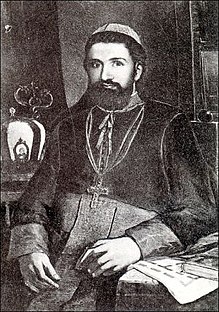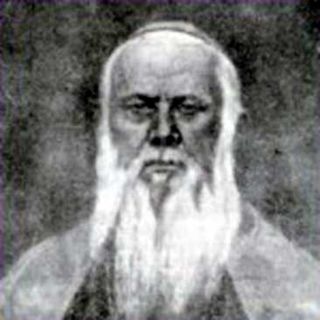
Ioan Sabo (16 August 1836 – 2 May 1911) was a Romanian Greek Catholic hierarch. He was bishop of the Romanian Catholic Eparchy of Gherla, Armenopoli, Szamos-Ujvár from 1879 to 1911.

The Greek Catholic Diocese of Cluj-Gherla is a diocese of the Byzantine Rite of the Romanian Greek Catholic Church. It is a suffragan of the Archdiocese of Făgăraș și Alba Iulia.
Born in Istrău, today in Romania (then Esztró, Kingdom of Hungary, Austrian Empire) in 1836, he was ordained a priest on 4 September 1859. He was confirmed the Bishop by the Holy See on 15 May 1879. He was consecrated to the Episcopate on 3 August 1879. The principal consecrator was Bishop Mihail Pavel. [1]

The Kingdom of Hungary between 1526 and 1867, while outside the Holy Roman Empire, was part of the lands of the Habsburg Monarchy that became the Empire of Austria in 1804. After the Battle of Mohács of 1526, the country was ruled by two crowned kings. Initially the exact territory under Habsburg rule was disputed because both rulers claimed the whole kingdom. This unsettled period lasted until 1570 when John Sigismund Zápolya abdicated as King of Hungary in Emperor Maximilian II's favor.

The Austrian Empire was a Central European multinational great power from 1804 to 1867, created by proclamation out of the realms of the Habsburgs. During its existence, it was the third most populous empire after the Russian Empire and the United Kingdom in Europe. Along with Prussia, it was one of the two major powers of the German Confederation. Geographically, it was the third largest empire in Europe after the Russian Empire and the First French Empire. Proclaimed in response to the First French Empire, it partially overlapped with the Holy Roman Empire until the latter's dissolution in 1806.

The Holy See, also called the See of Rome, is the apostolic episcopal see of the bishop of Rome, known as the Pope, ex cathedra the universal ecclesiastical jurisdiction of the worldwide Catholic Church, and a sovereign entity of international law. Founded in the 1st century by Saints Peter and Paul, by virtue of Petrine and Papal primacy according to Catholic tradition, it is the focal point of full communion for Catholic bishops and Catholics around the world organised in polities of the Latin Church, the 23 Eastern Catholic Churches, and their dioceses and religious institutes.
He died in Gherla, today in Romania (then Szamosújvár, Austria-Hungary) on 2 May 1911.

Gherla is a city in Cluj County, Romania. It is located 45 km from Cluj-Napoca on the Someșul Mic River, and has a population of 20,203. Three villages are administered by the city: Băița, Hășdate (Szamoshesdát) and Silivaș (Vizszilvás).

Austria-Hungary, often referred to as the Austro-Hungarian Empire or the Dual Monarchy, was a constitutional monarchy in Central and Eastern Europe from 1867 to 1918. It was formed by giving a new constitution to the Austrian Empire, which devolved powers on Austria (Cisleithania) and Hungary (Transleithania) and placed them on an equal footing. It broke apart into several states at the end of World War I.












